How to remove old grout from tile joints?
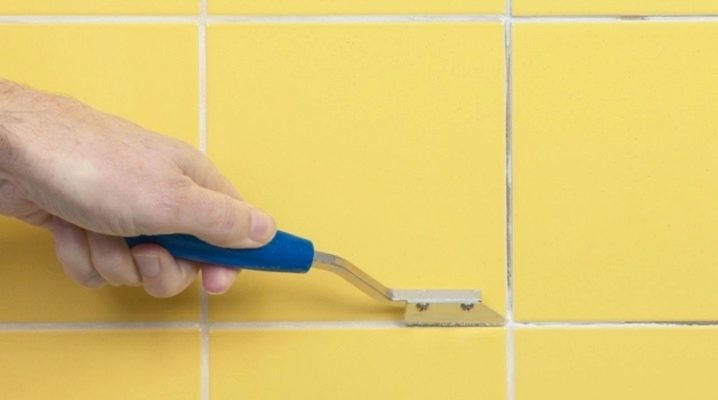
Facing tiles, embodied in more modern and high-tech options, have almost record durability. The same cannot be said about tile seams: they get dirty, darken from time to time, become covered with fungus. There comes a time when it is necessary to choose whether to change the entire coating or only the seam, from which it is often difficult to remove the old grout. It is quite possible to pick out the grout correctly on your own, if you figure out in advance what you need to buy and what you can save on.
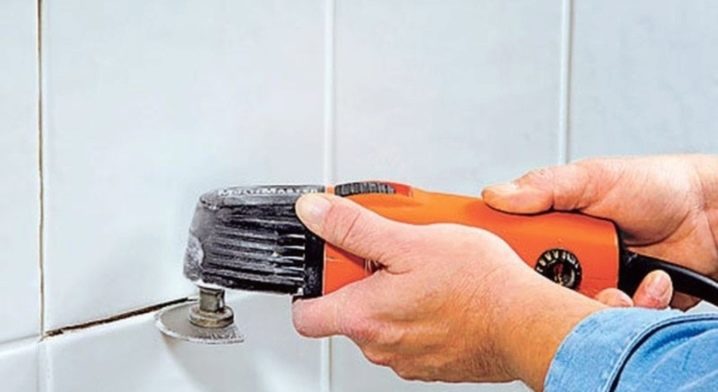
Mechanical removal
If the decision is made, you should decide on the main side of the process - the mechanical one. Grouting solutions lend themselves to softening with chemical compounds, however, in any case, the old grout holds quite tightly. Removing it requires a special tool and dedicated effort.
To recover the old solution, the following can be used:
- painting knife;
- opener of seams;
- dremel with a special attachment;
- other power tool;
- improvised means.


It is necessary to know in advance the function of each instrument.
Painting knife
This is one of the best hand tools you can use to clean grout out. A thin blade that hits the corner of a tile can bend, and this often prevents the glaze from chipping. The cheapness of replaceable blades allows you to constantly use a sharp working edge without wasting time sharpening.
The first movement cuts in the center of the seam. It is repeated 2-3 times until the blade goes to the desired depth. Then, by tilting the tool, they begin to remove the mortar towards the edges of the adjacent tiles. If a deep clearing is needed, the blade is pressed against the edges of the tiles in turn, again making movements to the depression.

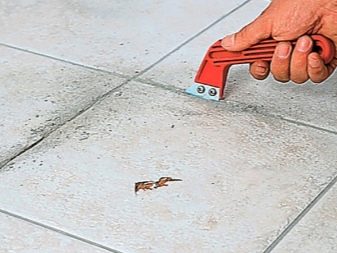
In "difficult conditions" (flooring, tile adhesive under grout), the first movements can be made with an unsharpened (obtuse) angle of the blade. When purchasing, make sure that the screw for fixing the blade is secure enough.
Expander of seams
A slightly different principle of operation for special knives for jointing. Their blades are comparatively thicker (1 - 1.5 mm) and are coated along the entire length of the working part with an abrasive. Thus, the jointer starts to clean the seam all over the width at once. Since the blades are removable, they can be easily purchased. The most popular is the Archimedes tile-cleaning knife.
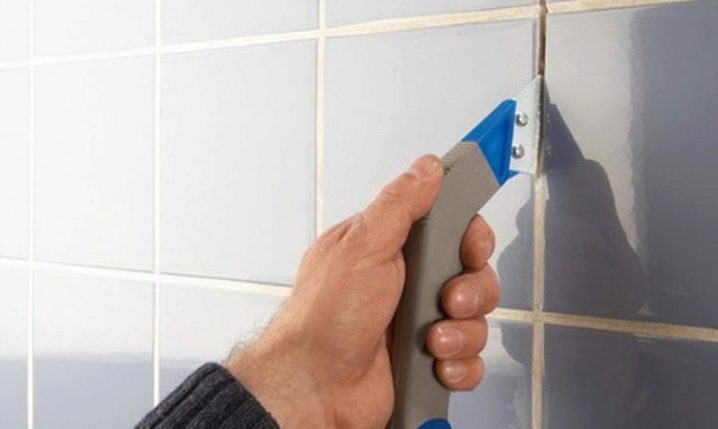
Dremel with special forces
Multifunctionality is the hallmark of this tool. For cleaning seams, the developers offer a carbide drill bit (Dremel 569) and a guide (Dremel 568). The drill diameter is 1.6 mm. The guide allows you to hold the drill strictly between two tiles, it is also possible to adjust the depth.

Other power tool
A power tool that is not intended, according to the instructions, to clean the seams, should be attributed to the improvised means. The result of its application is not very predictable and may depend on many factors, such as the skill and patience of the employee.
Sometimes use a drill (or screwdriver) with a "brush" (disk cord brush). A similar option is a grinder with a similar nozzle (a disk cord brush for angle grinders).


However, if the steel wire leaves noticeable marks on the tiles, this option should be ruled out.In any case, only a sufficiently experienced worker can achieve significant advantages over mechanical methods.
For floor seams, a drill with a 3mm winder drill is suitable as an analogue of a dremel. And for walls, you need to look on the market for some solid carbide version of a smaller diameter (the same Dremel 569). The drill is set at low or medium speed. You can apply a restrictor tip to the drill to keep it from sinking deeper than it needs to.
The drill should be held perpendicular to the surface and guided along the seam.

A grinder with a disc is suitable for rooms where a few sawn tiles will not spoil the overall look (for example, a basement or a car wash box). It is highly desirable to have a model that allows you to reduce the rpm.
The disk needs to be as thin as possible, and not new, but already well-worked ("licked").

Improvised means
A broken hacksaw blade, a boot knife, a chisel, a spatula, an old string with an abrasive, a thin diamond file can help out.
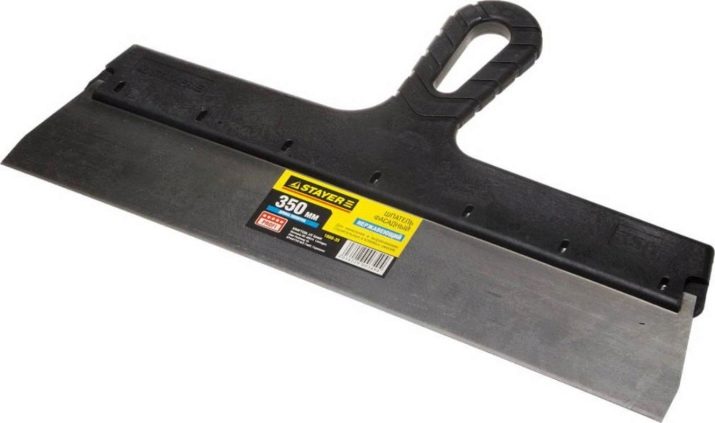





After using the main tool, traces of mortar that remain on the edges of the tiles are removed with the hard side of a kitchen sponge. The rigidity of this material is just such that it “takes” the solution and does not scratch the glaze at all. Another option is to use fine sandpaper (zero).


If the tile does not have glaze (porcelain stoneware, etc.), then there is no need to fear scratches.
You can find out how easy and simple it is to remove old grout from the following video.
Softeners
Chemical cleaners are sometimes said to remove old grout. This is not entirely true. For a perfect result, it is not enough to simply apply the product and then run a rag along the seam. However, chemicals can actually make the solution more malleable and make it easier to remove.


Seam composition
Different cleaners can be used depending on the components of the old grout.
For cement-based grouts
This is the most common type of grout. The reagent for them is acid. For two parts of water, add one part vinegar (9%). After impregnation, the seams should be left for one hour. Strong citric acid or even lemon juice will do.

More substantial assistance will be provided by industrial developments. They are called differently: “VALO Clean Cement Remover”, “Good Master Mortar Remover”, “Atlas Szop Concentrated Cement Residue Remover”, “Neomid 560 Cement Scale Remover”. The instructions must mention the grout (joint filler, grout).


After applying the composition, it should take from several hours to a day. Certain types of tiles and stones can be hopelessly damaged after contact with concentrated cleaning solutions. The instructions from the tile and cleaner manufacturers should be consulted. The product is tested in an inconspicuous area. If necessary, the edge of the tile is protected with masking tape.

For epoxies
Epoxies are completely waterproof and resistant to chemicals. Therefore, only special cleaners can help to remove them: "Litostrip" from Litokol; Mapei Kerapoxy Cleaner, Fila CR10, Sopro ESE 548.
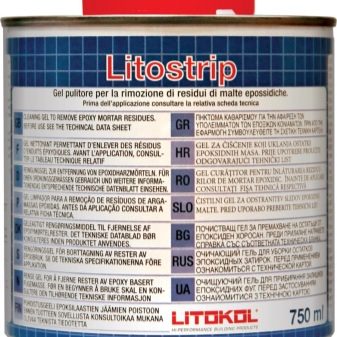

Sometimes it may be necessary to reapply the product.
For silicone sealants
Sealants quickly get dirty and often "bloom", after which they cannot be restored or improved. It is quite possible to remove the old sealant mechanically (with a knife, old credit card, coarse salt, etc.) or with a jet of hot steam (if there is a steam cleaner at home).


To use improvised household chemicals, you need to know the composition of the sealant. The acidic composition is softened with vinegar (at a concentration of at least 70%), alcoholic - technical or medical alcohol, for a neutral one, any solvent is suitable.


In order not to guess about the composition, it is easier to look for universal industrial products on sale: Penta-840, p, Mellerud Silicon Entferner, Lugato Silicon Entferner.


Some silicone sealant cleaners destroy plastic.
Individual protection means
Use protective goggles and a respirator when working with power tools. It is impossible to start procedures with "chemistry" without rubber gloves. In this case, the window must be open.


Do I need to replace the old grout
For one square meter of tiles, there can be ten or more meters of a seam. If you count the entire area of the cladding, the thought arises: "Is it possible to do without re-grouting?"
You can find out how much it is necessary to replace the old grout after small restoration measures.
You can try these methods:
- wash the seam;
- remove the top layer with emery;
- paint over with a special compound.


HG tile joint concentrate is marketed by Dutch manufacturers as a specialized cleaning agent for cement-based joints. In 10 minutes, the substance removes layers of soot and grease.

It can be used on a colored seam, but not on any stone.
Soiled white grout joints can be freshened with chlorine-based products. These include Whiteness, Domestos, Cif Ultra White. If there is simple bleach, dilute it with water, apply, and then rinse off after 10 minutes.

Chlorine is contraindicated for colored surfaces: discoloration will occur, and uneven. If there is a site for experiments, you can try folk remedies: baking soda, hydrogen peroxide (mix with water in a ratio of 1 to 2), acetic acid. Finally, you can also use general-purpose detergents, presented in a wide range: Ultra Stripper, Pemolux, Santry, Silit, BOZO and others.


If the contamination has not penetrated deeply, fine emery can be used. Bend or wrap the emery around the edge of heavy cardboard or other material. Of course, it will not be possible to achieve the previous aesthetic level, but this way you can update the seams in low-light places, above the baseboard, in the hallway.

Painting an old seam is a simple and effective way.
It can be done with the following types of products:
- marker with waterproof Edding 8200 ink, 2 colors: white and gray, line width 2-4 mm;

- Pufas Frische Fuge (white);
- whitening pencil "Snow" from BRADEX;


- Fuga Fresca (white).

All three methods can be combined. For example, wash off grease and paint, or after emery, walk along the seam with a coloring marker.
You can often see the joint crumbling around one floor tile and becoming half-empty. This means that the tile is now just lying on the screed. In this case, the problem with the seams cannot be solved until the tile is re-glued.
If the grout is cracked on the walls, this may mean that the entire tile coating is peeling and holding extremely poorly, so it will be easier to re-install the tile.

Features of the new seam
Useful lessons can be drawn from any experience. Before purchasing a grout, consider how to extend the life of your new joint.
Where the wall has been exposed to the fungus, it will be unwise to reapply the usual composition. The cleared joint must be treated to the full depth with an anti-fungal agent, it is worth choosing a trowel with the same properties, or at least carrying out the appropriate impregnation (Ceresit CT 10).

The seams near the washbasin or above the bathtub do not stay clean for long. However, they can be protected with Atlas Delfin or a composition of the required quality can be purchased, for example, CERESIT CE 40 with a water-repellent effect and the technology of "dirt repelling".


It is worth considering the option with an epoxy mixture, which is applied to the seam without additional impregnation.
Sometimes it is still better to replace the old grout if it is not possible to remove the consequences of operation. The tools described above will help get rid of the ceiling grout.
So, you can clean the old grout yourself. You don't need to have an expensive tool to do this. If the volume of work exceeds 10-15 squares, you should think about buying special agents that soften the solution. This will save you time and effort.














Thanks for the advice, we will try, just need to update the seams.
The comment was sent successfully.